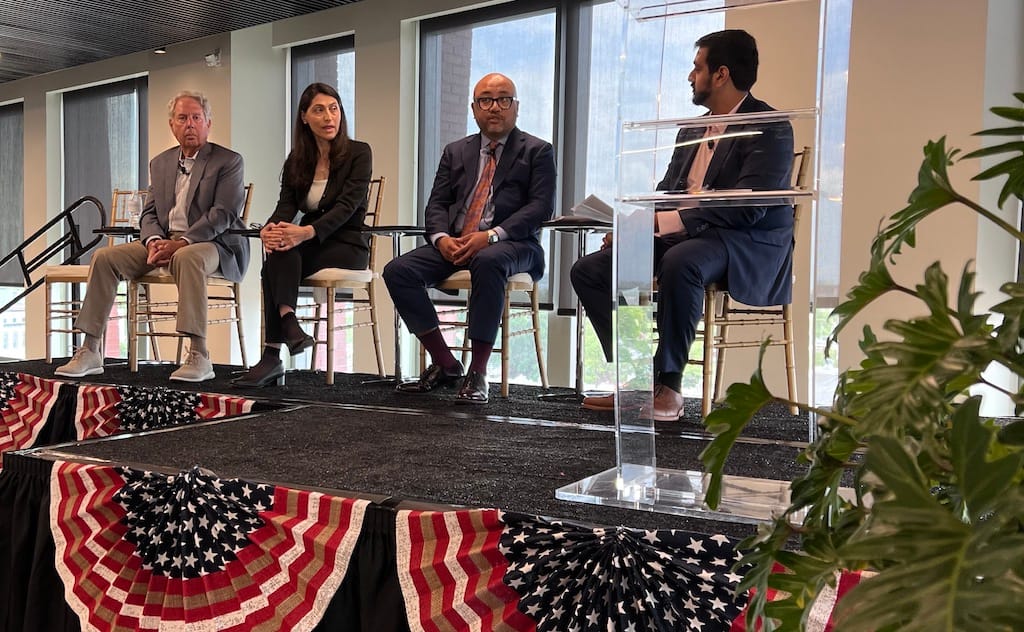U.S. Needs Robust Semiconductor Workforce Training to Make Progress on More Chip Independence
The country needs to work with schools to encourage semiconductor manufacturing training.
Enoch Eicher

WASHINGTON, July 10, 2023 – Panelists at a Broadband Breakfast event raised concerns about workforce shortages in the country’s pursuit to become more independent in the sourcing of semiconductor chips.
The U.S. semiconductor industry could face a shortage of about 70,000 to 90,000 workers over the next few years, according to a report from audit and consulting firm Deloitte. Consulting firm McKinsey also projected a shortfall of about 300,000 engineers and 90,000 skilled technicians in the United States by 2030.
Sign up for the Broadband Breakfast Club to access the complete videos from the Made in America Summit.
Maryam Rofougaran, cofounder and CEO of 5G chip manufacturer Movandi Corporation, pointed at the Broadband Breakfast Made in America Summit last Tuesday to a decrease in interest from high schoolers and college students in the field that is leading to a lack of skilled American workers in the development of the semiconductors.
Rofougaran called for immigration policies to be more friendly as America continues to look for highly skilled people in the semiconductor field, citing her own personal journey of immigration from Iran.
“I think immigration has been one of the greatest things for the US,” she said.
Gene Irisari, head of semiconductor policy at Samsung, asked, “Where are all these workers going to come from? They can’t just come from the clusters where the semiconductor fabs are being created.
“It’s got to be really a national effort and encompassing whether it be, universities, community colleges, there’s got to be standardized curriculum and there’s got to be a big push to get more students interested in engineering and then then into the semiconductor industry or one of the areas that semiconductor feeds into,” he said.
The Chips and Science Act, signed into law last summer, plows at least $52 billion in incentives to domesticate the manufacturing of the chips that are the brains for many important technologies, including future broadband builds.
The comments came a day after the federal government allocated to the states the money from the Broadband Equity, Access and Deployment program. The $42.5 billion is expected to help build out networks across the country.
While there have been economic tensions between China and the U.S. amid America’s attempt to make itself less reliant on Asia for the technology, panelists were concerned about demands to completely decouple the country from China.
“China is a large supplier of raw materials needed for manufacturing and a large consumer of microchips,” said Shawn Muma, director of supply chain innovation and emerging technologies, at the Digital Supply Chain Institute.
The panelists discussed America’s unwillingness to mine raw materials for itself, and with no foreseeable change to that on the horizon, there would need to be a continued reliance on countries like China, Indonesia, and Ukraine to do the “dirty” work of extracting and providing raw materials required for manufacturing microchips.
“It doesn’t behoove anyone to completely decouple with China,” Irisari said. “And to add to that, no one country can assume that they can control all of the semi-market.”
This comes after President Joe Biden and Indian Prime Minister Narendra Modi issued a joint statement that included American semiconductor company Lam Research training 60000 Indian engineers through its Semiverse Solution virtual fabrication platform, thus increasing the labor pool.
More recently on July 6, Treasury Secretary Janet Yellen went to China to meet with a new group of top economic policymakers led by Vice Premier He Lifeng.
Just days before she arrived in China, China’s Commerce Ministry announced forthcoming export controls on two metals used in the manufacturing of semiconductors.
America’s finance ministry said in a statement that during the meetings, the Chinese side asked the U.S. to remove tariffs on Chinese goods and stop “pressuring” Chinese companies, among other items.
Sign up for the Broadband Breakfast Club to access the complete videos from the Made in America Summit.










Member discussion